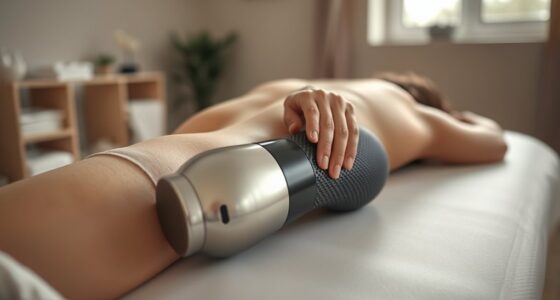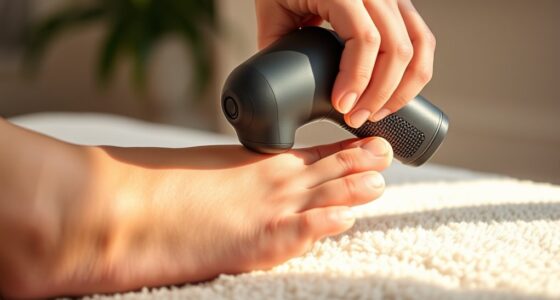Percussive therapy might help with muscle recovery, but as a pregnant athlete, you should be cautious. Its safety during pregnancy isn’t fully established, and hormonal changes can increase tissue sensitivity and injury risk. Avoid applying pressure over your abdomen or pelvic region, and opt for gentle techniques if you choose to try it. To keep safe, always consult your healthcare provider before starting or continuing any therapy—more important tips await you.
Key Takeaways
- Percussive therapy’s safety during pregnancy is not fully established; caution and medical consultation are essential.
- Gentle, non-invasive techniques may be safer, but avoid contact over the abdomen and pelvic region.
- Hormonal changes can increase injury risk; intense vibrations or pressure should be avoided.
- Postpartum use may support muscle recovery, but pregnancy use requires guidance from healthcare providers.
- Always consult a healthcare professional before incorporating percussive therapy into an athlete’s pregnancy routine.

Percussive therapy has become a popular tool for athletes seeking quick muscle recovery and relief, but pregnant athletes often wonder if it’s safe to use during pregnancy. If you’re steering through pregnancy while staying active, understanding how this therapy interacts with your body is essential. While percussive therapy can help reduce muscle tension and improve circulation, its safety during pregnancy isn’t fully established, so you should approach it with caution. Postpartum recovery is another stage where percussive therapy may be beneficial, aiding in muscle healing and restoring strength after childbirth. However, during pregnancy, the focus should be on gentle, safe practices to support both your health and your baby’s.
Percussive therapy may aid postpartum recovery but should be approached cautiously during pregnancy for safety.
When it comes to sports nutrition, maintaining ideal intake of nutrients like magnesium, potassium, and calcium is indispensable for muscle function and recovery. Proper nutrition helps prevent cramps and soreness, which might otherwise tempt you to seek additional therapies. Still, if you’re considering percussive therapy, consult your healthcare provider first. They can advise whether it’s appropriate based on your pregnancy stage and any underlying conditions. Remember, your body is going through many changes, and what’s safe for a non-pregnant athlete might not be suitable when pregnant.
Percussive therapy works by delivering rapid, targeted pulses to muscles, which can sometimes cause discomfort or overstimulation, especially in sensitive areas around your abdomen or pelvis. During pregnancy, hormonal shifts loosen ligaments, making you more susceptible to injury from intense pressure or vibrations. Using percussive devices without proper guidance could lead to unintended strain or soreness. For postpartum recovery, your body has already undergone significant stress, and gentle percussive therapy can support healing, but during pregnancy, it’s best to err on the side of caution. Additionally, understanding the effects of hormonal changes can help you better gauge what is safe during this time.
Focus on listening to your body. If you experience any discomfort, stop immediately and seek advice from your healthcare provider. Some areas, like your lower back, hips, and legs, may benefit from mild massage or gentle techniques, but avoiding direct contact over the abdomen or pelvic region is wise. Incorporating safe, approved methods into your sports nutrition and recovery routine can help you stay active while minimizing risks. Ultimately, safeguarding your health and your baby’s development should come first, so always consult medical professionals before trying new therapies during pregnancy.
Frequently Asked Questions
Can Percussive Therapy Help With Pregnancy-Related Back Pain?
Percussive therapy can provide relief from pregnancy-related back pain by relaxing tense muscles and improving circulation. However, you should prioritize exercise safety and avoid deep or intense treatments that could compromise pelvic stability. Always consult your healthcare provider before using percussive therapy during pregnancy, as they can guide you on safe techniques and ensure it complements your overall prenatal care plan.
Are There Any Risks of Using Percussive Devices During Pregnancy?
Think of percussive therapy as a delicate dance on a tightrope—you need to be cautious. The risks of vibration from these devices may impact your pelvic safety, especially during pregnancy. You could experience discomfort or unintended effects. Always consult your healthcare provider before use, as some areas might be more sensitive. Staying informed helps you keep balance and protect both you and your baby during this special time.
How Does Percussive Therapy Compare to Other Prenatal Pain Relief Options?
Percussive therapy offers targeted muscle relaxation that can help ease pregnancy discomfort, making it a useful pain management technique. Unlike medications, it provides a non-invasive option you can regulate, reducing muscle tension and soreness effectively. Compared to other prenatal pain relief methods like massage or heat, percussive therapy delivers deeper relief quickly. Always consult your healthcare provider before trying it to ensure it’s safe for your pregnancy.
Is There a Specific Gestational Age When Percussive Therapy Is Safer?
Coincidences often hint at timing, and that’s true for percussive therapy during pregnancy. You should consider gestational milestones when deciding on therapy timing; early pregnancy may carry more risks, while later stages might be safer. It’s best to consult your healthcare provider to determine the appropriate window, as individual circumstances vary. Always prioritize safety, especially when steering therapy options during different gestational ages.
Should Pregnant Athletes Consult a Healthcare Provider Before Using Percussive Therapy?
You should always consult a healthcare provider before using percussive therapy during pregnancy. This guarantees prenatal safety and helps identify any risks specific to your pregnancy stage. A therapy consultation allows your provider to recommend safe options and avoid areas that could cause harm. Prioritizing professional guidance helps you enjoy the benefits of therapy while protecting your health and your baby’s well-being.
Conclusion
So, while percussive therapy might seem like a quick fix for your pregnancy aches, don’t be fooled into thinking it’s completely risk-free. You’re already juggling enough, after all. Maybe it’s better to stick with gentle stretching and rest—less flashy, sure, but safer. Ironically, what promises relief could end up causing more stress. Trust your body, and remember, sometimes the safest choice is the simplest one. Your pregnancy journey deserves that kind of care.









